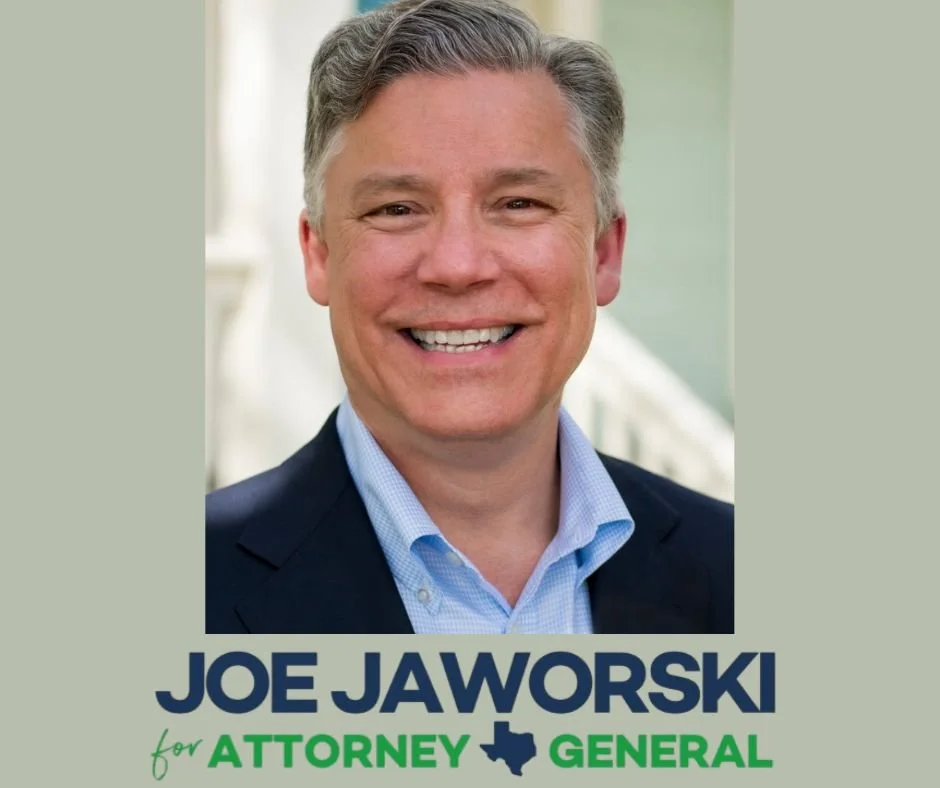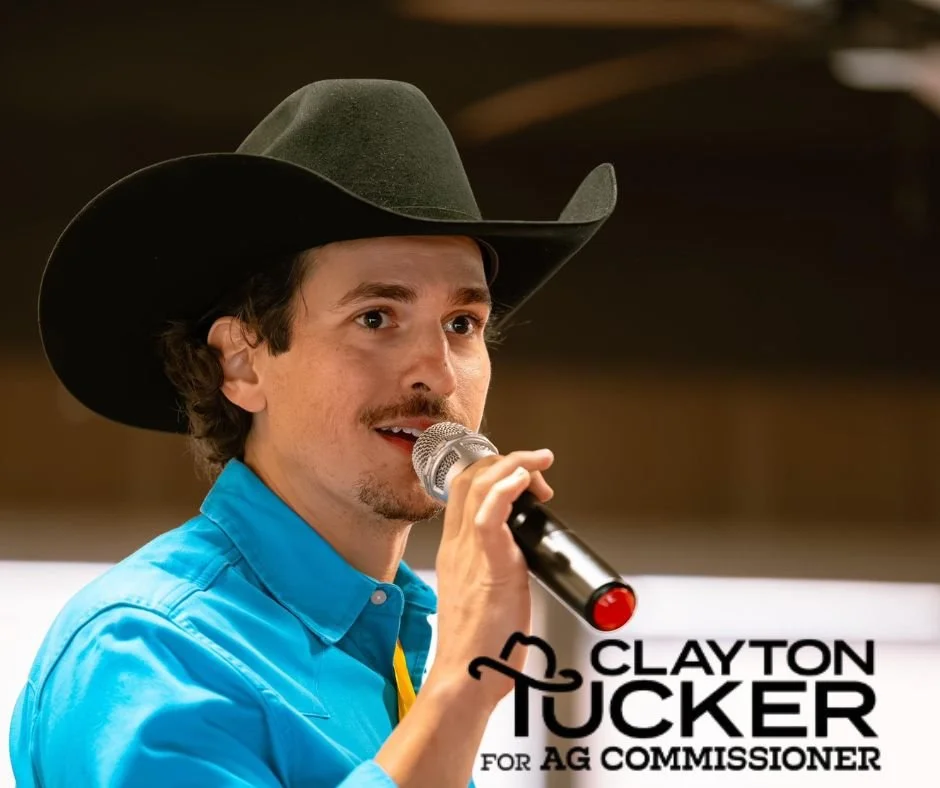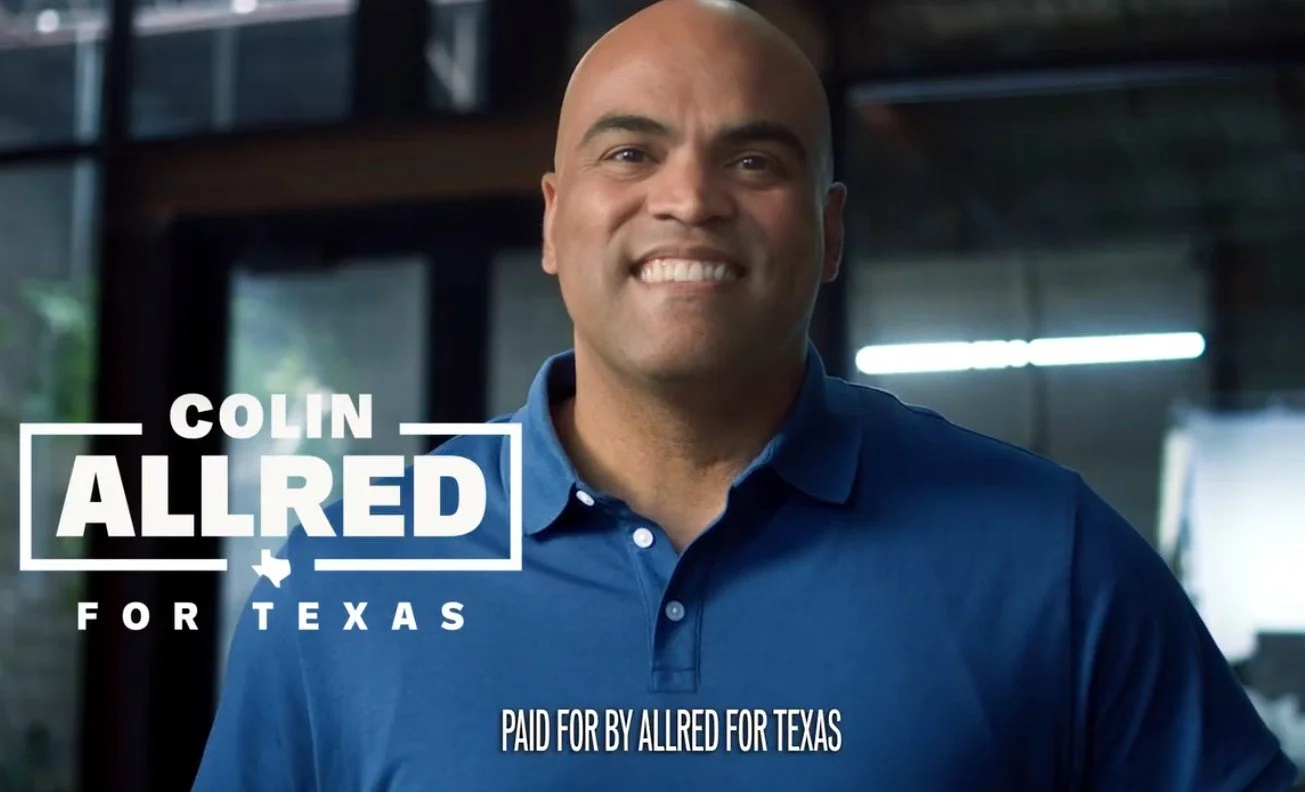Primary Candidates 2026
-

Meagan Tehseldar for Governor 2026
-

Bobby Cole for Govenor 2026
-

Nick Pappas for Govenor 2026
-

Vikki Goodwin for Lt. Governor 2026
-

Joe Jaworski for Attorney General 2026
-

Nathan Johnson for Attorney General 2026
-

Clayton Tucker for Ag Commissioner 2026
-

Danny Minton for U.S. Congress 2026
-

Terry Virts for U.S. Senate 2026
-

Mike Swanson for U.S. Senate 2026
-

Colin Allred for U.S. Senate 2026
-

James Talarico for U.S. Senate 2026
-

Amy Martinez-Salas for Texas State Senate
Voting Resources
2025 Elections Dates:
Last Day to Register to Vote Monday, October 6, 2025
First Day of Early Voting by Personal Appearance Monday, October 20, 2025
Last Day to Apply for Ballot by Mail Friday, October 24, 2025
Last Day of Early Voting by Personal Appearance Friday, October 31, 2025
Last Day to Receive Ballot by Mail Tuesday, November 4, 2025
Make sure you are prepared to vote in the next election.
2026 Primary Election Dates:
First Day to Apply for a Ballot by Mail Application (ABBM) or Federal Postcard Application (FPCA) Thursday, January 1, 2026
Last Day to Register to Vote Monday, February 2, 2026
First Day of Early Voting Tuesday, February 17, 2026
Last Day to Apply for Ballot by mail (Received, not Postmarked) Friday, February 20, 2026
Last Day of Early Voting Friday, February 27, 2026
Last Day to Receive Ballot by Mail Tuesday, March 3, 2026
Possible Uniform and Run Off Elections – more information on SOS website
2026 Midterm Election:
Last Day to Register to Vote Monday, October 5, 2026
First Day of Early Voting by Personal Appearance Monday, October 19, 2026
Last Day to Apply for Ballot by Mail (Received, not Postmarked) Friday, October 23, 2026
Last Day of Early Voting by Personal Appearance Friday October 30, 2026
Election Day Tuesday, November 3, 2026
Last Day to Receive Ballot by Mail Tuesday, November 3, 2026
Here are some helpful links from the local elections’ office:
Election Order and Notices: https://www.co.ellis.tx.us/1032/Election-Notices
Register to Vote: https://www.co.ellis.tx.us/740/Voter-Registration-Information
Voting by Mail Information: http://www.co.ellis.tx.us/739/Early-Voting-Information-Ballot-by-Mail
Regular Absentee Ballot Information: http://www.co.ellis.tx.us/DocumentCenter/View/5878/Ballot-by-Mail-Application-English—Revised-12-2021?bidId=
Absentee Ballot Information for Service Members, their families and overseas citizens: https://www.fvap.gov/guide?fouo=true
Public Offices in Texas – What are their roles?
Governor: The Governor is the chief executive officer of the state. They oversee the administration of state government, sign or veto bills passed by the Legislature, and serve as the commander-in-chief of the Texas National Guard.
Lieutenant Governor: The Lieutenant Governor presides over the Texas Senate, assigns bills to committees, and represents the state in official functions. They also succeed the Governor in case of vacancy.
Attorney General: The Attorney General is the state’s chief legal officer. They provide legal advice to state agencies, represent the state in legal matters, and enforce consumer protection laws.
Comptroller of Public Accounts: The Comptroller manages the state’s finances, including tax collection, auditing, and financial reporting. They play a crucial role in budgeting and fiscal matters.
Commissioner of General Land Office: This office oversees state-owned lands, mineral rights, and coastal resources. They manage public lands, oil and gas leases, and environmental conservation efforts.
Commissioner of Agriculture: Responsible for agricultural policies, promoting Texas agriculture, and ensuring food safety. They oversee programs related to farming, ranching, and rural development.
Commissioners, Railroad Commission of Texas: The Railroad Commission regulates the oil and gas industry, pipelines, and surface mining. It ensures safe and efficient energy production.
Chief Justice, Supreme Court of Texas: The Chief Justice leads the Texas Supreme Court, which handles civil and juvenile cases. They also oversee the state’s judicial system.
Justices, Supreme Court of Texas: These justices serve on the Texas Supreme Court and decide legal matters related to civil law, constitutional issues, and appeals.
Presiding Judge, Court of Criminal Appeals: The presiding judge leads the Texas Court of Criminal Appeals, which handles criminal appeals, writs of habeas corpus, and other criminal matters.
Judges, Court of Criminal Appeals: These judges serve on the Court of Criminal Appeals and handle criminal cases, ensuring due process and justice.
The County Chair position within the Texas Democratic Party plays a crucial role in local party leadership.
Organizing and Leading: County Chairs are responsible for organizing and leading the Democratic Party at the county level. They serve as a bridge between the state party and local communities.
Party Representation: County Chairs are the public face of the Democratic Party in their respective counties. They represent the party’s values, principles, and candidates.
Elections and Campaigns:
Voter Engagement: They work to identify, register, and inspire voters within their county.
Candidate Support: County Chairs support Democratic candidates running for various offices, from local to federal levels.
Campaign Coordination: They coordinate campaign efforts, including organizing events, canvassing, phone banking, and fundraising.
County Conventions: County Chairs oversee the organization of county conventions, where local Democrats gather to discuss party business, elect delegates, and adopt resolutions.
Collaboration: They collaborate with other county party officials, precinct chairs, and volunteers to strengthen the party’s presence and impact.
Advocacy and Outreach: County Chairs advocate for Democratic policies and engage with community organizations, elected officials, and activists.

